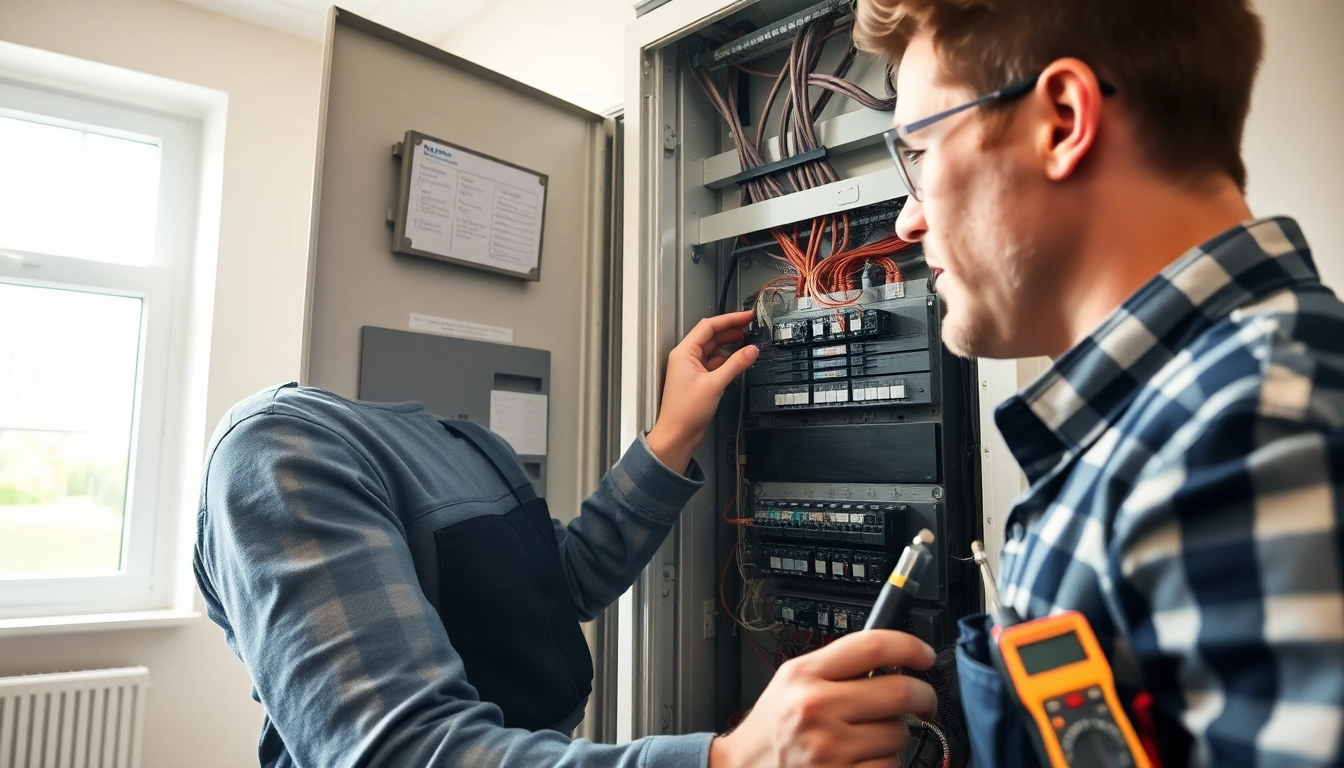Key Considerations for Electrical Panel Clearwater Upgrades and Maintenance

Understanding Electrical Panel Components
When it comes to the safety and functionality of your home, the electrical panel plays a crucial role. It is the central hub that distributes electricity to various circuit breakers, ensuring that your home’s electrical system operates seamlessly. Understanding the components of your Electrical Panel Clearwater is key to assessing whether it’s time for an upgrade.
Types of Electrical Panels
Electrical panels come in various types, tailored to meet differing requirements. The most common types are:
- Breakers Panels: These are the most common type, consisting of individual circuit breakers that can be replaced easily when one trips.
- Fuse Panels: Older homes may still have fuse panels. Technically, they utilize fuses instead of breakers, which can be less convenient and pose safety issues.
- Main Panels: This type acts as the primary distribution point for the electrical service in a household.
- Subpanels: Typically used to distribute power to specific areas of a home or a separate building, helping to manage increased load without overloading the main panel.
Key Parts of an Electrical Panel
Each electrical panel includes several key components that contribute to its functionality:
- Circuit Breakers: These automatically shut off electrical flow in case of overloads or faults, providing a critical safety mechanism.
- Main Breaker: The master switch that can cut off power to your entire home.
- Bus Bars: These are conductive strips within the panel that distribute electricity to different circuits.
- Neutral Bars: They provide a path for electricity to return safely after completing its circuit.
- Grounding System: Essential for safety, it helps prevent electrical shock by directing excess electricity to the ground.
Functions of Breakers and Fuses
Understanding the function of breakers and fuses is essential for any homeowner. Breakers act like switches that automatically interrupt power, safeguarding your home from overloads and shorts. Unlike fuses, which must be replaced once blown, circuit breakers can simply be reset. This feature leads to less downtime and increased safety, making breaker’s systems a preferred choice.
Signs You Need an Upgrade for Your Electrical Panel Clearwater
Recognizing when your electrical panel requires an upgrade can prevent hazardous situations and improve the convenience of your home. Below are key indicators to watch for:
Frequent Circuit Breaker Trips
If you find yourself resetting circuit breakers frequently, it may indicate that your panel cannot handle the current load. This scenario might arise due to added electrical devices or simply aging infrastructure. A consistently tripping breaker signals a pending overload, warranting a thorough evaluation of your electrical system.
Burning Smells or Discoloration
A burning odor near the electrical panel or visible discoloration on the panel itself can be harbingers of serious electrical problems. Such signs typically indicate overheating or potential electrical fires, necessitating immediate professional attention. Ignoring these signs could pose significant dangers to your home and safety.
Increased Energy Bills
If your energy bills have spiked without significant changes in usage, it could reflect issues with your electrical panel. An outdated panel may not operate efficiently, leading to wasted electricity. Evaluating efficiency and upgrading if necessary can ultimately save money over time.
Benefits of Upgrading Your Electrical Panel Clearwater
Investing in an electrical panel upgrade may seem daunting, but the benefits far outweigh the costs. Here are several advantages to making this important change:
Enhanced Safety Features
Modern electrical panels are equipped with advanced safety features that can minimize risks associated with overloads and shorts. Upgrading can significantly improve your home’s safety, providing peace of mind that your family is well-protected from potential electrical hazards.
Increased Power Capacity
As our dependence on electrical devices increases, the power demand in homes has also risen. An upgraded electrical panel can accommodate more circuits, thus enabling the use of more devices without the risk of tripping breakers. This added capacity can be especially beneficial for homes that are planning to add significant electrical loads, such as new appliances or home extensions.
Improved Energy Efficiency
Older panels often lack the efficiency of modern systems. Upgrading can improve energy distribution, allowing homeowners to save on energy costs through reduced wastage. Additionally, it may enable energy-efficient practices through smart wiring systems and circuits designed for new technologies.
Choosing the Right Time for Upgrades
Determining when to upgrade your electrical panel can involve various considerations. Here are tips on how to ascertain the right time:
Evaluating Your Home’s Electrical Needs
Assess your current electrical usage and consider any upcoming changes that might elevate your electricity demand. If you regularly purchase new appliances or consider adding home technology, an upgrade may soon be necessary.
Consulting with Professionals
Engaging with a licensed electrician can provide insights that are specific to your home’s condition and expectations. They can assess load capacity, safety requirements, and any local building codes that might influence your decision.
Assessing Local Building Codes
Local regulations regarding electrical systems are crucial to adhere to for safety and compliance. Before undertaking any upgrades, check that your new panel meets current codes, not only for safety but also for future resale value of your home.
Maintenance Tips for Electrical Panel Clearwater
Proper maintenance of your electrical panel can enhance its lifespan and performance. Here are essential maintenance tips to follow:
Regular Inspection Schedules
Establish a routine inspection schedule with a qualified electrician who can evaluate the condition and functioning of your electrical panel, identifying any potential issues before they escalate.
Cleaning the Electrical Panel
Dust and debris can accumulate on and inside the electrical panel, potentially leading to overheating. Regularly cleaning around the panel and having it professionally cleaned can help maintain its functionality and safety.
When to Seek Professional Help
Do not hesitate to reach out to a professional electrician if you notice unusual signs or behaviors in your electrical system. Regular check-ups and prompt responses to warning signals can prevent larger issues from arising, ensuring your home remains a safe, efficient environment.



Leave a Comment